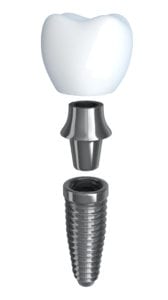What are dental implants?
A dental implant is just one part of a whole system that can replace missing or damaged teeth. An implant is a small titanium post that a dentist places in the jaw bone via a surgical procedure. The post will act as the replacement tooth root to retain and support the replacement teeth. Replacement teeth can be prosthetics such as a dental crown, dental bridge, or denture.

How many dental implants will I need to replace my teeth?
The amount of implant posts you will need depends on how many teeth you are missing. The former location of the lost teeth in your mouth and how much available bone you have will also be factors. If you only have one tooth missing, the dentist can place a single implant and dental crown.
However, if you are missing many teeth, the dentist can use a denture or bridge to replace them. A dental bridge will require at least two dental implants to support it. A denture will need about four-to-six implants per arch to secure it.
How do dentures attach to the implant posts?
There are two ways the dentist can connect dentures. He can use a removable implant overdenture to snap onto the implant posts. Implants can also secure a fixed denture. Here, the dentist screws the denture onto the implants, and only the dentist can remove it.
You will never need to rely on suction or adhesive to hold the prosthetic in place, no matter how the dentist attaches the denture.
How are dental implants like natural teeth?
The dental implant post sits in the jaw bone, similar to how a tooth root sits in the bone. Here, the implant will stimulate the bone, just as a tooth root does, and prevents bone loss. The implants will also help the replacement teeth function similarly to natural teeth.
What are the disadvantages of dental implants?
Dental implants involve undergoing a surgical procedure; therefore, they have the same risks as any other surgery. This includes the chance of infection, pain, bleeding, or inflammation. Your mouth also takes a while to heal and fuse with the dental implant.
The dentist cannot immediately attach the permanent prosthetic to the implants after surgery. Your mouth and jaw bone will fully fuse with the dental implants after about three-to-six months. Using dental implants to replace missing teeth may cost significantly more than a removable denture as well.
How long will my dental implants last?
Teeth implants consist of titanium and will never suffer from decay. However, it is important to take care of your overall health and oral health. Brush at least twice a day, floss at least once a day, and visit your dentist regularly so your dental implants last a lifetime.
How many teeth can dental implants replace?
Dental implants can replace any number of teeth. From one missing tooth to all missing teeth! To learn how implants can solve your tooth loss problem, schedule a consultation with Dr. Boenning at his Towson, MD, dental office.
